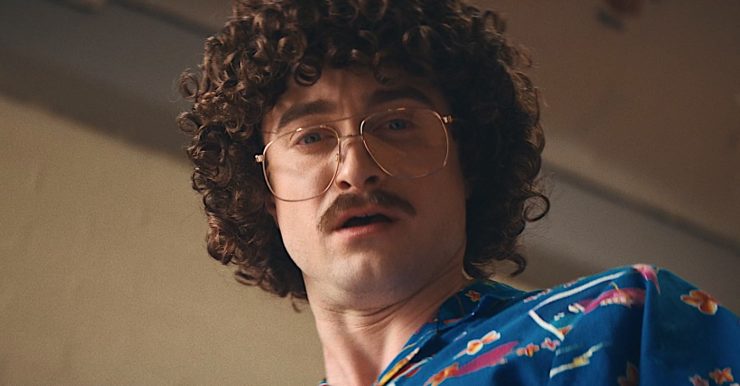There was a point, about half an hour into Weird: The Al Yankovic Story, when I almost choked on my Twinkie.
I was eating a Twinkie (because, come on, it’s a Weird Al movie) and a thing happened that was so goddamn funny I almost choked to death. It would have been worth it. Honestly, it might have been the best possible way for me to go out.
Weird is a parody biopic, based on a Funny or Die short that Eric Appel made in 2013. In the short, Aaron Paul plays Al as a drunken, violent rock god, occasionally romanced by Olivia Wilde’s Madonna. In order to expand the idea into a full-length film, Eric Appel wrote the script with Al himself, using biopics like Bohemian Rhapsody and Notorious B.I.G. as springboards. They’ve brought Daniel Radcliffe in as Al, Evan Rachel Wood as Madonna, Rainn Wilson as Dr. Demento, and comedic cameos that have to be seen to be believed to fill out all the musical luminaries Al has met over his long and storied career. (One of those cameos almost lead to my death-by-Twinkie; I’ll talk about it in a spoiler section in a sec.)
The movie follows the classic trajectory of “abused kid grows into a life of rock’n’roll debauchery, then has to decide what’s really driving him to create”. There’s an ill-advised romance, a pivotal acid trip, and some reprehensible public behavior. Of course Weird Al, who has been gently—and sometimes not so gently—tweaking the music industry for 45 years, would make a movie that mocks all the tropes and cliches of the musical biography.
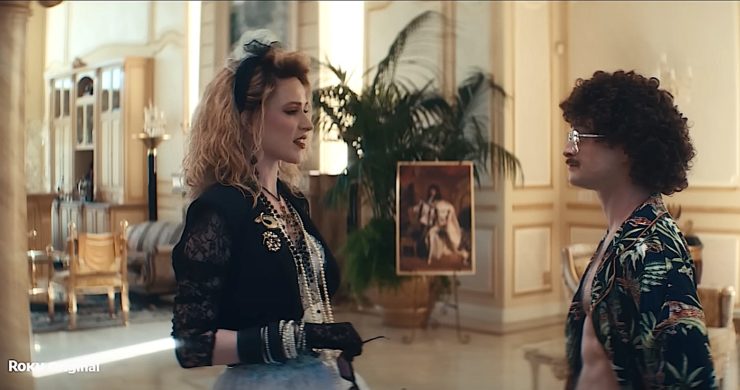
The performances are uniformly excellent, but I want to take a second to talk about Evan Rachel Wood’s Madonna. She wears a “Borderline”-esque costume at all times, no matter what’s going on. Fine. But where it becomes really funny is that she’s also, always, chewing a wad of bright pink bubblegum, and blowing the occasional inappropriately-timed bubble. And what makes it really, really funny is that she always has two rosaries of different lengths around her neck, along with an ornate silver cross, and a black plastic cross dangling from her right ear. If she isn’t blowing pink bubbles she’s gnawing on one of the crucifixes. This is a perfect ongoing choice, a detail that sums up early-80s Madonna’s desperation to shock people in a nice over-the-top detail, without ever becoming so ridiculous that it stops being funny.
But naturally the thing I really want to talk about is a spoiler.
So, come with me if you’ve seen it so I can jump up and down and yell, and then I’ll dive into non-spoiler discussion below.
Seriously, hop down now if you want to go in cold, as I did.
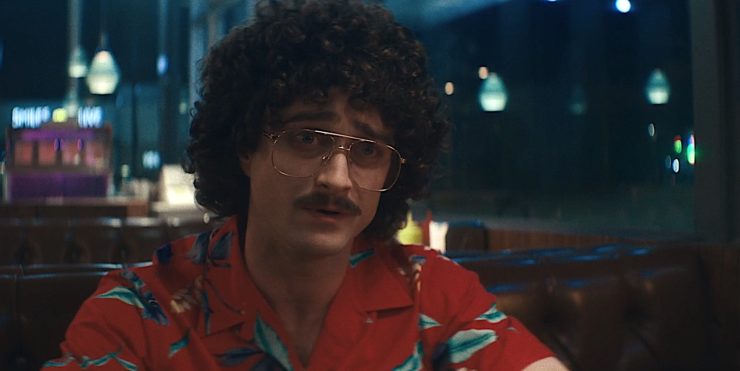
WHAT WERE THEY THINKING WITH THAT POOL SCENE???? FUCKING CONAN O’BRIEN PLAYED FUCKING ANDY WARHOL???? WHAT??? WHAT WAS THAT??? WHY DID THEY DO THAT TO ME PERSONALLY????
WHAT.
Ahem.
The pool party at Doctor Demento’s house is the sort of scene that, if you have the right kind of brain, can make you feel much less alone in the world.
Rainn Wilson as Doctor Demento. Perfect. Jack Black as Wolfman Jack? I mean, yeah. David Dastmalchian as John Deacon, you know, the bass player from Queen? Emo Phillips as Salvador Dali fss. Grace Jones, Divine, Kate Pierson, a couple of the guys from DEVO all just hanging around, Pee-Wee Herman and Alice Cooper played by 2/3rds of The Lonely Island. And then Conan O’Brien shows up as Andy Warhol and I confess I had to pause the film for a few minutes just to be glad I’m alive.
Especially since that Twinkie had just tried to kill me.
OF COURSE Andy Warhol, Salvador Dali, and DEVO would all go to pool parties together. OBVIOUSLY.
All right, I’ll stop now, back to the review.
It’s safe to come back! On with the rest of the review.
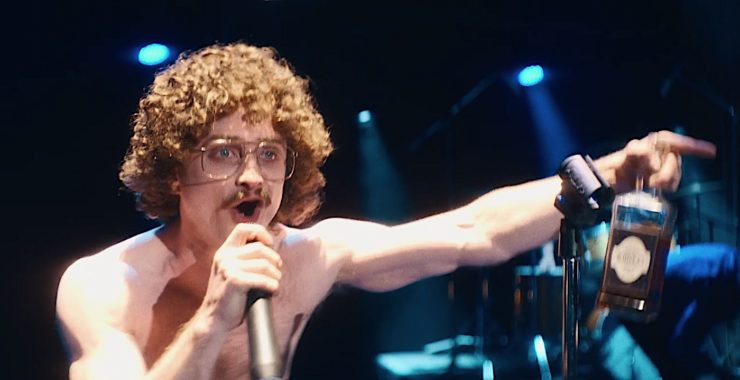
There are a lot of tacks you can take when making a music biopic
A few weeks ago my beloved colleagues Emmet Asher-Perrin and Sylas K. Barrett came with me to Moonage Daydream, the (fantastic) Bowie movie. I haven’t gone out to movies much since the plague fell upon us, but I figured this was worth the risk. And I was right. Moonage Daydream is a fascinating work, a sort musical/spiritual biography pulled together from interviews and live performances, that add up to give people a gripping account of Bowie’s intellectual life as narrative arc.
(Does anyone’s life have a narrative arc? Or does it just seem like it sometimes? I have themes in my own life for sure, but maybe I can just pick them out in hindsight.)
That’s one way to do it. There’s Control, an absolutely stark and realistic take on the brief life of Joy Division, especially Ian Curtis’ struggle with epilepsy and depression. There’s the aforementioned Bohemian Rhapsody, which is maybe the biggest touchstone here, with all of its frustrating compression of time and sudden, historically-inaccurate lightning bolts of inspiration. There’s Walk the Line, which draws bright, shining lines of mathematical causality between traumas in Johnny Cash’s life and his music, which is totally how creativity works… (But Joaquin Phoenix is great.)
Over in the realm of parody, there’s Walk Hard: The Dewey Cox Story, which is a masterpiece because it comments so beautifully on that mathematical causality I just mentioned. (Also, I’ll be muttering “wrong kid died” on my fucking deathbed.) There’s Pop Star: Never Stop Never Stopping, which is a surprisingly warmhearted take on a Justin Bieber-esque pop brat. Finally, finally, I have an excuse to share a link to what is, in my opinion, one of the great comic masterpieces of the 21st Century: JD Ryznar’s 12-part webseries about the history of Yacht Rock, which tells the tale of how Kenny Loggins, Michael McDonald, and several members of Steely Dan fought an interstellar battle with an evil space empire. It’s brilliant and makes me laugh harder than anything this side of AD/BC.
And there’s Rocketman, a movie I was frankly shocked to love as much as I did, which leans into the high camp of Elton John by being a surreal musical about the love and partnership between Elton and Bernie Taupin.
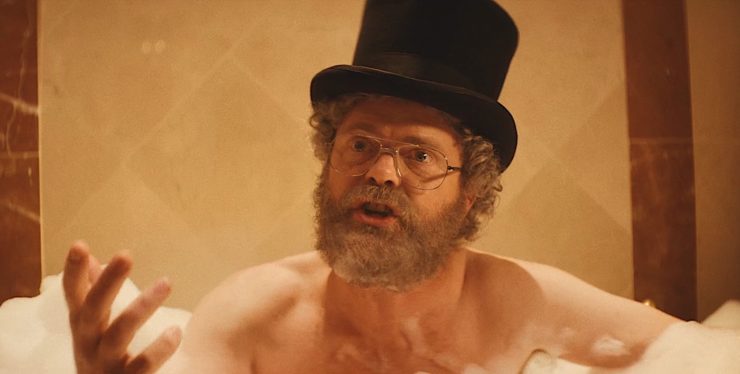
Of all of these, I was surprised to see Weird aligning more with the last one than any other.
It’s…I don’t know how else to say this, but it’s the irony gap between knowing Al and the Al that’s being presented. Rather than relying on taking the tropes of a biopic to ridiculous extremes this movie takes those tropes and applies them to Al specifically. But beyond that, it’s a joyful celebration of weirdness.
The point of the pool scene is that everyone there is a fucking weirdo. A misfit. A nerd, a freak. Queer icons, prop comics, people with degrees in math tucked away in their pasts.
The scene where Al writes “My Bologna” is a perfect summation of the movie’s tone, perfectly dinging scenes in Walk the Line and Bohemian Rhapsody of songs appearing, fully formed, out of the ether. It was made funnier by the fact that I’ve been reading Bono’s (really, really good) memoir, Surrender. As Bono is a proper Irish mystic this is exactly how he talks about songs—the good ones arrive on their own—and having just watched the clip of “One” coming together, seeing Daniel Radcliffe staring in awe at a package of bologna did wonderful things to my brain. If you’ll forgive me my own earnestness, this is how it is sometimes. A scene, a line, or in my case, most often a joke, will show up in my brain, and it feels like someone’s twitched a curtain back to show you the inner workings of the universe. So seeing this applied to “My Bologna” is a special type of joy already, but then to know that the subsequent recording session is one of the only accurate moment in the movie—they really did record the song in a pubic bathroom because the acoustics were good—creates a fantastic gap between reality, cliche, capital-R reality, and silliness.
But the other, other thing here, the thing that raises this movie to a level of importance to a certain type of person, can be found in Seth Meyers’ interview with Al and Daniel Radcliffe.
There’s a certain trajectory with Al I think. Meyers summed it up by saying that the first time he heard “Eat It” on the radio, “and as a kid, I remember thinking, this [redacted] changes everything.”
And that’s how it is! For a couple of generations of people, hearing Al on the radio, seeing him on MTV, or seeing UHF was an incandescent moment when a grown-up made fun of other grown-ups. When you, the kid, were invited to laugh at things that were usually taken seriously. An overly earnest song about gang violence becomes a song about food. A maudlin song about the death of a couple Boomer music icons becomes a song about The Phantom Menace. A song glorifying sexual harassment become a song about grammar. (And in Daniel Radcliffe’s favorite Al song, Bob Dylan’s groundbreaking classic becomes a festival of palindromes.) When Al used to take over MTV he’d splice interviews with celebrities together to point out their shallowness and pretension. When he made UHF the plot was built around note-perfect parodies of the blockbuster films that we were all supposed to take seriously during Oscar Season.
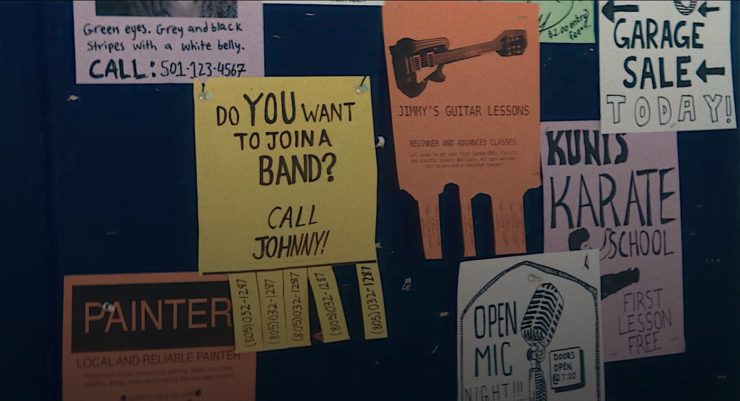
I can’t even remember the first Al song I ever heard, because what I remember was watching UHF until the tape fell apart. And then scotch-taping it back together so I could keep watching it.
I could probably still, with little effort, recite most of the film.
There are certain phrases (“7:30??!” “Ah, a red snapper!” “Don’t you know the Dewey Decimal System???”) that pop into my head, unbidden. And because I had a very interesting childhood, I’d already seen Network and Invasion of the Body Snatchers (the ‘50s one) so I knew who Kevin McCarthy was, and when Stanley Spudowski does his “Life is like a mop” speech, I knew what it was parodying. I knew why it was important. (Not as important as a Devil’s Tower carved out of mashed potatoes, but, you know, important.) Watching the film was like the Captain America I Understood That Reference meme, in my brain, for two hours. It felt…good. Great actually. I felt smart, knowledgeable, in on the joke. Is there anything a kid wants more than to be in on the joke? But it wasn’t just a barrage of references, there was pure silliness like Twinkie wiener sandwiches (yes, yes I have eaten those) and Raul’s Wild Kingdom, and the way George Newman and his best friend Bob throw grapes into each other’s mouths during business meetings. There was the way George Newman tries to give a chihuahua a ladle of punch from a punch bowl—why shouldn’t the dog share the punch everyone’s drinking? There’s the mobster with a detachable meat cleaver hand. There’s the joyous telethon at the end, there’s everything about Philo (did you know Philo was originally meant to be played by Joel Hodgson, before Anthony Geary took over the role and gave his own perfect performance?), there’s the phrase “festering bowl of dog snot”, there’s just… everything.
Shit, I retract my earlier statement: I can, with zero effort, recite the whole film.
About that spoilery cameo I detailed above—without giving anything away, was UHF my introduction to camp? Was that the first time I ever threw myself into the irony gap, between the expected, the serious, the realistic, the high art, and the pure joy of silliness? The subversion? The popping of the balloon? It was probably Pee-Wee Herman, actually. But I watched UHF more than Pee-Wee’s Big Adventure.
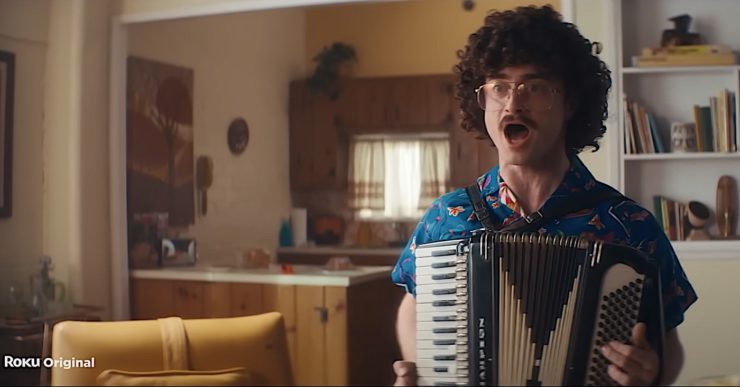
And more than that. Back when Bo Burnham was just starting out, he ended up on “The Green Room”, basically a talk show by and for comedians. He appeared on an episode with Garry Shandling, and the two ended up discussing whether comedy can be based in love rather than anger, fear, snarkiness, pettiness—the usual comedy loam. And I think that’s what’s so revolutionary about Al. Al’s comedy comes from a place of joy. The point of UHF is that the weirdos triumph over people who are smug and cruel. (But, it’s also important to note, the villain of the film ends up being hugged and comforted by one of the heroes.) The point of Weird is that listening to yourself, and expressing your own unique creativity is great—Al doesn’t need an absurd rock’n’roll trajectory to make music that matters to people. His creativity is just as important as that of the people he’s parodying.
Maybe “My Bologna” didn’t come to Al in a blaze of inspiration, but yes, actually, that ridiculous song is every bit as deserving of awe as “Bohemian Rhapsody” or “One”. Seth Meyers is correct—”Eat It” did change everything. Being silly as hell, making people forget their problems for the duration of a three-minute pop song, singing about Yoda or Albuquerque or the Amish or being white and nerdy is just as valid as anything else. And now Al has added to his oeuvre with a movie about that is so transcendently silly it honors all the other work he’s done, but also sneaks in a real message about how it’s good to be weird.
Weird: The Al Yankovic Story is available to stream for free RIGHT NOW on the Roku channel so I don’t even understand why you’re reading this. Go watch it, and then come back here and tell me your favorite Weird Al song.
Leah Schnelbach understands that sometimes, life is like a mop, and sometimes, you have to fight the drug cartels in your mind to achieve your dreams. Come be weird with them on Twitter if it still exists when you read this!










